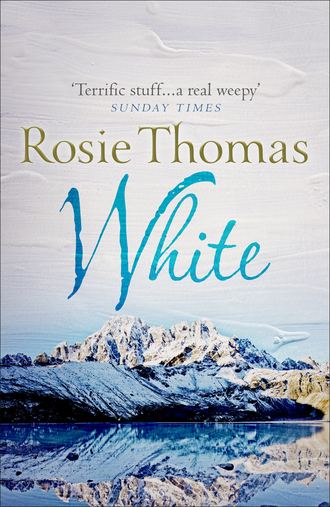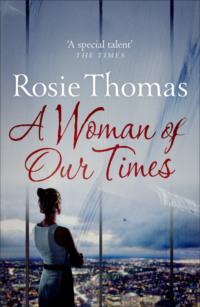
Полная версия
White
‘It’s okay,’ he soothed her. Her hand was clammy; he rubbed the skin on the back of it gently with his thumb. ‘It’s just storm turbulence. Nothing’s going to happen to us. You’re safe.’ He reached to the seat pocket and laid the paper bag on her lap, just in case, on top of the book. He noticed now that it was Touching the Void, a classic account of a climbing catastrophe and its aftermath.
He nodded pleasantly at it. ‘I read that. Quite a story.’
She rolled her head. ‘I think I’d rather be down a crevasse than up here.’
‘Thanks.’
‘Look. Don’t expect me to be polite and kind. Just talk to me. Tell me about yourself, if you like.’
‘An invitation no male could refuse. Where should I begin?’
He told her about why he had been visiting his father and about running, and his work and its problems, trying to make it twice as interesting as it really was. He avoided mentioning Frannie, although once or twice he caught himself saying we and he knew she had registered it. The plane’s bucking and shuddering gradually eased, and in-flight service began. By the time he was putting a large vodka and tomato juice into her hand, Finch’s colour had improved. She drank half the measure down straight.
‘Thanks again.’
‘Steady.’
She had let go of his hand minutes ago. Now she picked up Joe Simpson’s book again. ‘I think I’ll read some more of this.’
It wasn’t until they had begun their descent into Vancouver that he broke in on her once more. ‘You know all about me, I don’t know anything about you. Is that a fair arrangement, do you think?’
She smiled briefly. ‘I shouldn’t think so. What do you want to know?’
In response to a series of direct questions he learned that she had been in Oregon for her best friend’s wedding. She practised in the city with a partner, she had four brothers all older than she was, her father was an architect he had vaguely heard of and her mother was a mother. She lived alone in a city apartment. And yes, she was seeing someone at the moment. Although she flashed a warning glance at him just for asking.
They had landed and were taxiing towards the stand when he put the final, inevitable, schlocky question he couldn’t think of any way around. ‘Can I call you some time? Maybe we could have dinner.’
Finch sighed. She had gathered up the flowers again and they made her look as if she was headed for the altar. ‘I don’t think so, Sam.’
‘Why not? I’m harmless, maybe even quite amusing. What have you got to lose?’
‘Nothing.’ They were stationary at last. Raindrops glittered on the window beyond her shoulder. ‘I’m not going to be here. I’m going away for a while.’
‘When?’ he asked grimly. Somehow he would see her again, whatever it might take.
‘In a couple of weeks. And I’m really busy before then, getting ready for it.’
‘Where?’
She hesitated. Then a so-what smile crimped the corners of her mouth. ‘Out to Nepal. Kathmandu. Then on to Everest. I’m joining an expedition to climb it. Medical officer.’
‘You’re a climber. You don’t just read about it? That’s extraordinary.’ Shaking his head, he reached out mentally to all the curtains of denial with which he had shrouded his adolescence and pulled them down with one breezy sentence. ‘Because I climb too. Mad about it, ever since I was a kid.’
Her eyes narrowed. ‘I thought you said you were a marathon runner. A failed Olympic one.’
‘That too. Where will you be staying in Kathmandu?’
‘Why do you want to know?’
‘I’ve been there. Some of the hotels are pretty dire, in my experience. Just want to be sure you’ve picked a decent one.’
In fact, he had never been further west than Hong Kong. He tried hard to remember anything he had ever read about the Nepali capital. Ancient. It was really ancient and seriously polluted. Would that do?
Finch sighed. ‘It’s the Buddha’s Garden. I’m not planning to change it. And that information is of no conceivable use to you.’
The forward doors were open. The passengers ahead of them had shuffled their way out and Finch was already on her feet, bending her head under the overhead lockers.
‘All information has value,’ Sam said. ‘Let me help you with your bag. Or at least carry your bouquet for you.’
‘I can manage.’
They were in the chilly corridors. She was slipping away from him, but it didn’t matter. He could deal with that.
Immigration was about to separate them. Sam was still counting himself lucky that he had had his passport on him.
‘Goodbye,’ Finch said seriously. ‘Someone’s here to meet me, or I’d offer you a lift. Thanks for your company.’
‘So long, Finch.’
Then she was gone. Sam was left alone in the arrivals hall at Vancouver airport at one in the morning, with his car and his girlfriend and his stalled life waiting for him in Seattle. From the taxi line, John Belushi was glaring reproachfully at him.
Two
It was snowing in North Wales, too. It was a different small segment of the world’s weather envelope, but the local effects were the same as in Vancouver or Oregon.
Alyn Hood paid no attention either to the bitter wind or the blur of snowflakes flying into his face and weighting his eyelashes. He stood on his doorstep for a moment, gazing thoughtfully into the darkness as if it were the middle of a summer’s afternoon. Then he turned and locked the door of the cottage, dropping the heavy key into his pocket. He set off down the path, bareheaded with his coat hanging loose, at a steady pace that indicated no hurry, or any awareness of the climate.
It was a long descent, down a rutted track where the potholes were already deceptively smoothed out by the settling snow. The man was a sure-footed walker. His easy pace never varied.
The track joined a lane at a gatepost where the plastic letters of an old sign, their cracked curves and serifs having acquired an eyebrow of snow, announced the name of the one-storey slate and stone cottage to be Tyn-y-Caeau. He turned left into the muffled silence of the lane and continued to descend the hill. His footprints threaded a solitary one-way trail in his wake. Half a mile further on, a tiny cluster of yellow lights showed thinly between silver-furred stone walls. There were perhaps a dozen houses here and a whitewashed pub turned grey by the insistent whiteness. There were no cars in the car-park, but a regiment of wooden bench-and-table sets in the frozen garden to the side indicated that this might be a popular place in more forgiving weather.
Alyn Hood went straight to the low door and pushed it open, familiar with its movement. A heavy draught curtain, attached to a rod on the back of the door, swung with it. There was a bar framed by glasses and bottles, a man behind its rampart polishing a tankard, and two customers. All three faces turned to the new arrival.
‘Al,’ the barman greeted him. The other two men nodded. One was very old, with a flat tweed cap welded to his head, the younger had a sheepdog asleep at his feet.
‘Pint, Glyn,’ Alyn Hood said.
‘Right you are.’ The barman pulled it and stood the handle glass to dribble on a bar towel.
‘Bit dead tonight,’ the sheepdog man said wonderingly, as if this room with its ticking clock and smoky fire usually resounded with cheering and dancing on table-tops.
‘Blasted weather,’ Glyn judged. ‘You’d expect a sign of spring, this time of year.’
‘It’s only March,’ Alyn Hood said mildly. He took his pint to a round table near the fire and sat down.
‘When is it you’re off this time, then?’ Glyn pursued him.
‘Couple of days.’
‘Bad enough here,’ said the sheepdog man.
Alyn smiled and the room fell silent again. He sat for perhaps twenty minutes, nursing his pint and looking into the red coals. A couple came in and sat in a corner murmuring together, their hands entwined.
Five minutes later the door whirled open once more, admitting a blast of cold air and a young woman who stamped her feet energetically to shed a ruff of snow. She looked around the bar and saw Al. ‘Thought I might find you.’
‘Molly. What are you doing here?’
‘Duh. Looking for you, maybe? Went up to the house, car there but not you. Where else could you be but down the pub? Do I get a drink?’
‘Coke?’
‘Nn.’ Molly put her head on one side. Her wiry hair was spangled with melted snow. ‘I’ll have a whisky and ginger ale, thanks.’ She stared a challenge at her father.
‘You’re not old enough. You driving?’
‘Get real. I’m eighteen. Near enough. And how else d’you think I got here from Betws? Mum lent me.’
Al sighed. His only child was a grown woman now, almost. Because he had missed so many of the vital, infinitesimal shifts of growth that had delivered her from sweet babyhood to this point, he knew he didn’t have the right to tell her she was too young to drink whisky, or anything else for that matter.
‘Very small Scotch and plenty of ginger, please, Glyn. And I’ll have a half.’
They took their drinks and sat opposite each other at the table. Father and daughter were noticeably alike. Their heads and hands were the same shape, and they sat in the same position with their legs pointing towards the fire and their ankles lazily crossed.
‘How is your mother?’
Molly regarded him. ‘The same.’
‘Did she send you?’
‘No. Well. In a way, I suppose. I said I was coming over and she offered me the car.’
They lifted their glasses at the same moment and thoughtfully drank.
The man with the tweed cap levered himself off his stool and headed for the door. ‘Night all. See you again, I hope, Alyn. All the best.’
Molly’s face drew in. The contraction of her mouth and eyes made her look angry. When the door had closed once more and the eddies of cold air were dispersed she said, ‘Don’t go back there. Don’t. I don’t want you to.’
There was a flicker in her father’s eyes, a shift in his glance that acknowledged and at the same time evaded her demand. Molly saw it and Al knew that she saw it. ‘I have to go, Molly. It’s what I do.’
‘You don’t have to. That’s a lie.’
‘I don’t lie to you, Moll. I try not to. Did your mother tell you to come here and say this to me?’
It was weary, over-trodden ground to Alyn. And the careful neutrality that Molly assumed in answering was a reminder that she had had to intercede for too long in the disputes between her mother and father.
‘No,’ she repeated. ‘I came to say it myself. Dad, please don’t go. I’ve got a bad feeling about this time.’
He smiled then, briefly, and put his hands over hers. ‘You always have a bad feeling. Remember? And I always come home, don’t I?’
She would not meet his eyes. He turned her hands over, looking at the smooth palms, remembering these fingers when they were baby-sized and the way they curled to grip his adult forefinger. Holding on to him hard, even then.
‘Listen. I have to do this trip.’ For all kinds of reasons he was drawn back to the mountain. They were not, he acknowledged to himself, reasons he would care to analyse with his daughter. ‘I have to do this one and after I’ve done it I’ll hang up my boots.’
‘Do you mean that?’
From her mother, over the years, Molly had heard enough about her father’s faults. She knew well enough what he was bad at and deficient in, and out of her own sense of fair play she had privately reckoned up his strengths. In order to compensate.
One of them, perhaps the foremost, was that he was so strong. Not just physically, although he was that too, like iron – or one of his own smooth coils of rope, that was better. Iron was too rigid, where Al was supple. It was that he never gave way or compromised or stepped down. You were always certain of what he would do and the way he would do it, and that gave him a kind of … serenity, if that was the word. Like a rock face, too. The weather kept on changing over and around it, but the rock stayed there, solid as.
She couldn’t think of anyone else she knew who held so unwaveringly to what he believed in and wanted, the way Al did.
If you looked at it from one side it was selfishness, that’s what her mother would claim. But if you took another perspective it was clarity and a sense of purpose. He held on to what he believed in and he kept on going until he was where he wanted to be. Whatever the obstacles were. That was why he was a fine mountaineer. And why she was wasting her breath now.
Love felt weighty inside her, with the nauseous edge lent by fear for his safety. It was a helpless sensation that Molly was used to. ‘Do you mean that?’ she repeated.
‘Yes.’
It was true. He did mean to make this the last one. Or to wish it, with part of himself. And with another part he rejected the impulse entirely. It was the old, insoluble dilemma of climbing.
When you were there, doing it, you had the shot of adrenalin in your veins. This, this balance of focus and fear, was the crystallisation of reality. The brilliance of perception and nerve and concentration made you think you could pass straight into another dimension. And the mind’s reaction to that very intensity, like a dull serum to counteract climbing’s snakebite madness, was to make you long perversely to be comfortable and languid, and safe.
Al looked around the motionless room and listened to the clock’s steady ticking. What he had seen and done made all of this peripheral. Even his daughter’s drooping head. Almost as soon as you were home, safety was colourless and suffocating.
It made you turn back to the mountains. Once more and yet once more.
But he was forty-five now. Realistically, he couldn’t expect to lead too many more major commercial expeditions like this one.
Alyn realised that Molly was waiting for him to say something further. ‘Okay. You know I’m going to lead a group of clients up Everest for an American company called the Mountain People. These are rich men, with big ideas and they pay a lot of money for the chance to go up there. The owner of the company, George Heywood, believes that I am a good guide and he pays me well for the job. And I certainly need the money. As you also know.
‘Obviously, it means I get one more chance at the summit myself. I’ve never climbed the big E and I want to, very much. I’ve done most of the other major peaks.’
‘K2,’ Molly said bleakly.
It was after what happened on K2, five years ago, that Jen Hood decided she had had enough. Either Alyn stopped climbing, or they stopped being married. Two and a half years later they were divorced.
Al nodded, understanding the reminder, heading off for now the memories that went with it. ‘Yes.’
‘Is it that important?’
After a moment Al said absently, almost as if he hadn’t been listening to the question, ‘Yes. It is.’
Glyn put down his polished tankard and briskly rang a brass bell that hung behind the bar. ‘Last ones, please.’
‘I’ll have another whisky and ginger, thanks.’
‘No, you won’t. You can come home and have a cup of tea with me, if you want.’
‘Oh, cheers.’
But they went outside together and found that the snow had stopped falling. A glimmering blanket lay over the dry-stone walls and etched the trees, and the rock faces were black holes traced with edges of pearl.
‘Pretty,’ Molly commented. She unlocked the doors of her mother’s rusting Metro and nodded Al inside. The interior smelled of plastic and Obsession, Jen’s favoured perfume. The climb back up the hill to Tyn-y-Caeau was tricky, with the car’s rear wheels skidding in the tractionless snow.
‘I can do it,’ Molly said angrily when her father tried to intervene, and she negotiated the rutted track right up to his front door.
The cottage’s one main room smelled of damp and woodsmoke.
While her father went into the kitchenette to make tea, Molly dropped her coat on a chair and nosed around among his sparse possessions. There was a laptop computer on an untidy desk and a fax machine with a couple of faxes poking out of it. She read the top one; it was from the Mountain People. The message was uninteresting, to do with porters and supplies of bottled oxygen. The second one was a typed list of names with question marks and comments scribbled by hand next to them. Hugh Rix, she read. British. Aged 54, experienced. Bullshitter, though. Mark Mason, British, writer, 36. Moderately experienced. Dr Finch Buchanan. Canadian, ???? The message concluded, All will be revealed in time, mate. See you in Kathmandu. Ken. This was only slightly less uninteresting.
The rest of Al’s furniture consisted of a worn sofa and an unmatching armchair, a small shelf of books, mostly biographies and modern history, a round table and chairs, and a couple of lamps, one of them with a badly scorched shade. There was no television, no picture on the bare walls. It was the room of a man unconcerned with physical comfort and apparently indifferent to the reassurance provided by material possessions. It was cold. Molly knelt down on the stone hearth and tried to stir some life into the fire. A small flame licked up from a bed of ash.
‘Thanks, Moll,’ Al said when he came back with two mugs and a plate of toast and Marmite.
‘Haven’t you had dinner?’ Molly asked when they sat together on the sofa and she watched him devouring the food.
‘No. Had a couple of other things to do.’
She remonstrated, ‘Dad.’ As a response he took her foot that was curled underneath her and pulled it towards him. Affectionately he massaged it, kneading the arch and stretching the toes. They were both reminded of all the other separations, over the years, the times when Molly had begged him to stay with her and Al had protested, making light for her of the distance and the danger. It seemed as if there had always been another mountain, or an unclimbed line to attempt, or an expedition for him to lead. He would leave, and there would be the occasional crackling telephone call or scribbled letter, and the weeks would go by and at last he would reappear. Gaunt and weather-beaten, and apparently happy to be home. Then, almost within a week, he would be standing at the window, looking out at the sky, plotting his next departure.
Molly had loved him besottedly all through her childhood. Al was rich icing, balloons, celebrations. Jen was bread and butter, everyday, always there.
She sighed and withdrew her foot. The divorce had been grim, but she was old enough, now, to understand her mother’s reasons. She resumed her contemplation of the room, looking at the titles of the books, and the Mountain People’s letterhead sticking up from the fax tray and, something she hadn’t noticed before, a snapshot of herself Sellotaped to the wall beside the desk. She was sitting on a beach beside a lopsided sandcastle, aged maybe four or five, naked and with her hair matted in salty curls.
She didn’t visit her father up here very often. Tyn-y-Caeau was twenty miles from where she lived with Jen in Betws-y-Coed and Molly had only just learned to drive a car. But she had wanted to come tonight, to see Alyn and deliver her pointless entreaty. He would come over to say goodbye to Jen and her before he left, but those visits were never comfortable. No one ever said what they thought because – they all understood this now – saying things didn’t change any of them.
‘I love you, Dad,’ she said suddenly. Just in a straight voice, as if she were announcing what time it was, with no overlay of parodic sentimentality or swoop of melodrama to distance herself from the offering.
He looked at her and she saw two things.
One was the way he must appear to other people, women or clients or whatever, as a man. As someone you would trust with your life, because that was the responsibility he took. And the other was the way he looked at her, uniquely, because he was her father. These two were pulling in opposite directions, because the man you would trust with your life didn’t go with all the dues and small sacrifices that belonged to fathers and families.
It was the first time Molly had understood this clearly enough to be able to put it into words herself.
‘I love you too,’ he said.
It was the truth, of course, she knew. It was both too much and not enough for her. She had to bend her head to hide the tears in her eyes. Al didn’t see. He was watching the fire, seemingly.
‘And I don’t want you driving all the way home at this time of night. Call your mother and tell her you’re staying here with me.’
After a minute, Molly took the mobile phone he held out to her and prodded out the number. Jen answered at once and gave her response. With a precise finger Molly guided the phone’s little antenna back into its socket.
‘She wants the car back by nine tomorrow morning.’
‘Any other message?’
‘No.’
She drank the last of her tea, now gone cold.
‘I’ll sleep on here,’ Al told her, patting the sofa cushion. ‘You’d better get off to bed.’
When she was lying down, he went in to see her. She was curled on her side, with one hand flat under her cheek, just as she used to settle down when she was a little girl. He pulled the covers around her shoulders and touched her hair.
I am tucking her up, he thought. Just like … Only there hadn’t been all that many times, in her childhood. He had always been away.
‘Goodnight, Al.’
She didn’t often call him by his name.
‘Goodnight, baby.’
Nor did he call her that. She had never been a very babyish child.
Afterwards, he stood over the dying fire with his elbows resting on the mantelpiece and his head in his hands. My daughter is eighteen, he thought, all but. Grown up. Ready for whatever.
Silence seemed to stretch away from him, a great curve of it. It contained this house and the hillside, and the distance he had to travel, all the dimensions of it.
He thought of Spider, the memory catching him unawares as it often did and startling him with its vividness. His voice clearer than his face now, before the last trip to K2, all the years of expeditions fat with success or dim with failure, and the escapes and the drinking and the total reliance on one another that went with them. The absence of him no less punishing than it had been from the first day. And then, inevitably, came the thought of Finch Buchanan. He remembered her face.
Canadian, ???? Ken Kennedy had written. Meaning, I don’t know anything about her. Meaning, we’ll find out in the fullness of time and that will be soon enough. To Ken she was only a name on an expedition list, whereas to Al she was a reality, twisted up with Spider in the past and even with Jen. But no one else in the world except Finch herself knew that and Al wondered if after all this time even she remembered what had happened between them.
The snow’s blanket thickened the silence, once the wind had dropped. It cost Al an effort to move, to open cupboards in search of a blanket and so to break the immense, smooth ellipse of it.
Jen’s house was square, double-fronted grey stone with a purple slate roof. It stood back a little from the main road, with a short path of Victorian encaustic tiles leading to the front door. The next morning Al parked his old Audi outside the gate and followed Molly past the iron railings. The snow had melted overnight and passing traffic churned grey slush into the gutter.
Molly turned her key in the lock. ‘We’re back,’ she called.
‘Kitchen,’ Jen answered. They found her at the rear of the house in the wash-house beyond the kitchen itself. She was wearing yellow rubber gloves and loading sheets from a plastic laundry basket into an industrial-capacity washing machine. After the divorce Jen had bought this too-big house with a loan from her father and had set up a bed-and-breakfast business. Plenty of climbers and walkers and fishermen came to Betws-y-Coed, even in March.
‘Can I do anything?’ Al asked.











